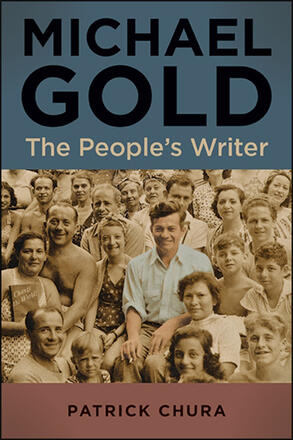
Michael Gold
The People's Writer
Alternative formats available from:
An authoritative biography of the dean of American proletarian writers during the interwar years.
Description
Winner of the 2022 Literary Encyclopedia Book Prize presented by the Literary Encyclopedia
Winner of the 2022 Paul Cowan Non-Fiction Award presented by the Peace Corps Worldwide
Jewish American Communist writer and cultural figure Michael Gold (1893–1967) was a key progressive author of his generation, yet today his work is too often forgotten. A novelist, essayist, playwright, poet, journalist, and editor, Gold was the leading advocate of leftist, proletarian literature in the United States between the two world wars. His acclaimed autobiographical novel Jews without Money (1930) is a vivid account of early twentieth-century immigrant life in the tenements of Manhattan's Lower East Side. In this authoritative biography, Patrick Chura traces Gold's story from his impoverished youth, through the period of his fame during the "red decade" of the 1930s, and into the McCarthy era, when he was blacklisted and forced to work menial jobs to support his family. In his time as a radical writer-activist, Gold courageously helped strikes, protested against war and fascism, worked for the Unemployed Councils, walked in hunger marches and May Day parades, got arrested in support of Sacco and Vanzetti, raised money for workers' cooperatives and leftist journalism, and demonstrated against nuclear weapons and in support of fair housing, the Rosenbergs, and civil rights. This biography welcomes Gold back into cultural conversations about art, literature, politics, social change, and Jewish American life in the twentieth century.
Patrick Chura is Professor of English at the University of Akron. He is the author of Thoreau the Land Surveyor and Vital Contact: Downclassing Journeys in American Literature from Herman Melville to Richard Wright.
Reviews
"Chura has offered us our first extensive study of an author who has long needed attention." — Eugene O'Neill Review
"…this biography is a welcome addition to the body of scholarship treating US literary radicalism, not least because it draws upon an expanded archive: interviews with Gold's two surviving sons, Nicholas and Carl; a better, newly declassified version of Gold's FBI File; and a treasure trove of previously unpublished poems, plays, and short stories, as well as an untitled memoir … [It] pays testament to the courage of a man who accepted the limitations imposed by the present in order to hasten the arrival of a different kind of future. This lesson should not be lost." — American Literary History
"Patrick Chura does a wonderful job developing the life and times of Mike Gold. He highlights the context in which Gold lived and developed his radical perspective … this is a wonderful introduction to the rich cultural life of the political left in the years between World War I and the 1960s." — Socialism and Democracy
"As one learns from Patrick Chura's excellent biography, Michael Gold: The People's Writer, the tentacles of Gold's influence, in his heyday, spread far and wide. Moreover, Chura, in what constitutes the first full-scale Gold biography, drives home the point that anyone who professes to represent a progressive point of view owes no small debt to Gold, who, since the early 1950s, has gone largely unrecognized." — Los Angeles Review of Books
"The fact that Michael Gold exists as the first ever book-length treatment of Gold to be published by an academic press is a welcome development that suggests the American academy is increasingly ready to treat seriously U.S. radical writers. Chura's biography of Gold deserves to be read in undergraduate and graduate English and history classes that focus on class as well as by a more general public interested in the literary left." — American Communist History
"The biography, written not in the language of the academic but more in narrative fashion, glows with the evidence of investigative details. Chura shows an ability to absorb streams of reportage, unpublished poetry, early pencil visions of fiction, memoir notes, letters, seemingly lost first drafts as well as overlooked and forgotten works of a certain stature. It's all here." — People's World
"In his new biography, Michael Gold: The People's Writer, Patrick Chura calls Gold 'the best American writer that is still largely unknown to Americans' and makes it clear why he thinks Gold should finally be released from his political prison … the Gold that emerges from his book was not just a 1920s rebel and a 1930s radical but also a forerunner—more in his aesthetics than his politics—of the Beat 1950s and countercultural 1960s." — The Nation
"Masterfully intertwining Gold's life with the radical history of cultural activism Chura exposes contradictory evidence; that a long historical strain of racism, classism, and anti-Semitism is extant in America, lying in wait for a leader to tap into that vein of ugliness." — Peace Corps Worldwide
"With its huge amount of new and not readily available biographical material, this book offers a quantum leap forward in our understanding of the life of this controversial Jewish American Communist author." — Alan M. Wald, author of Exiles from a Future Time: The Forging of the Mid-Twentieth-Century Literary Left
"This book brings Mike Gold to life in a way that previous studies have not. As the only full-length biography of Gold, it successfully demonstrates just how important a figure he was by providing a comprehensive overview of his work, activism, and life, as well as revealing how well known and influential he was as a radical thinker and artist. The scholarship is incredibly impressive, and much care has gone into thinking about and writing this book." — Catherine Rottenberg, editor of Black Harlem and the Jewish Lower East Side: Narratives Out of Time